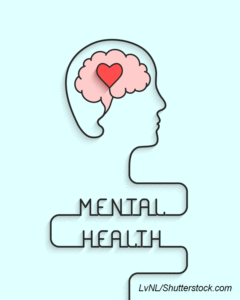Ten years ago, a former colleague published an evocative memoir about her struggle with depression, her road to recovery, and her ongoing management of the condition. I was floored by her revelation. When we worked together, she was an “it” girl – intelligent, witty, beautiful, athletic, and seemingly successful in all aspects of her life. And yet her struggles were very real, very painful, and very nearly fatal.
She is not alone.
 TIME magazine’s special issue on mental health tells us that 450 million people worldwide struggle with mental health issues. In the United States alone, one in five people experience some form of mental illness each year. Those afflicted increase their mortality risk by 26% and are decidedly more susceptible to metabolic syndrome, chronic stress (and the attendant physiological distress), and altered immune function. TIME estimates the worldwide annual cost of mental illness to be $2.5 trillion and projects growth to $6 trillion by 2030. Suffice it to say, it’s an emerging health crisis.
TIME magazine’s special issue on mental health tells us that 450 million people worldwide struggle with mental health issues. In the United States alone, one in five people experience some form of mental illness each year. Those afflicted increase their mortality risk by 26% and are decidedly more susceptible to metabolic syndrome, chronic stress (and the attendant physiological distress), and altered immune function. TIME estimates the worldwide annual cost of mental illness to be $2.5 trillion and projects growth to $6 trillion by 2030. Suffice it to say, it’s an emerging health crisis.
The stigma attached to mental illness creates an impediment to effective treatment. It takes courage to seek help in a society that often deems mental disorder as a sign of weakness. Yet the emerging science tells us that these brain disorders have their basis in biology and require intervention. We need to change the public discourse to create a safe space for people to get the help they need.
For the past 60 years, antidepressants have been a bedrock of psychiatric treatment. However, 30% of the target population do not respond well to them. Of the remainder, it could take a process of trial-and-error to find the right medication and dosage to produce a workable result. Unfortunately, the longer one stays in a state of depression, the harder it becomes to set things right.
While depression can affect every one of us at any age, we are at increased risk in our 60s and beyond. There’s an increased incidence of seniors living without family members nearby. Upwards of 20-25% of Baby Boomers do not have children. That combined with a plethora of solitary entertainment can result in a downward spiral of loneliness.
So, what can we do to maximize our own mental health?
- Get a good night’s sleep every night. Try to go to bed at the same time every night and arise at the same time every morning. Have a calming ritual at night that helps you prepare for sleep.
- Eat a healthy diet. The same dietary risk factors that give rise to heart disease also affect brain health.
- Exercise! It’s not just good for the body; it’s good for the brain! Physical activity elevates mood, bolsters energy, and stimulates the production of endorphins. It also desensitizes the body to certain kinds of emotional distress.
- Prioritize spending time with people. Socialization is one of the best things you can do to sustain a healthy brain and ward off depression. Stay in the workforce. Volunteer. Join clubs. Put the welcome mat out and invite friends over.
- Consider living in an intentional community. The younger generation has embraced this lifestyle, often as a function of economic necessity. The fifty-five-and-over crowd has access to a broad range of planned communities all across the country, primarily in warmer climates. A handful of multi-generational communities are sprouting up as well. Or simply forge connection within your neighborhood.
- Engage in mindfulness training. It helps you focus on the present rather than ruminate on the past, among other benefits. For those of us who have trouble sitting still, try floating on water. Early evidence suggests that it lowers anxiety, relieves muscle tension, and engenders a relaxed state of mind.
- Seek professional help. As a case in point, cognitive behavioral therapy focuses on changing negative thought patterns and finding new approaches to problems.
- Get a pet. Research has shown that pet ownership lowers blood pressure, heart rates, and heart disease risk. And pets are a proven antidote to anxiety and loneliness.
- Use light therapy if affected by Seasonal Affective Disorder. It can be a mood and energy booster first thing in the morning.
- Focus on all the things about which you can be grateful and let go of grievances and disappointments. Make a habit of forgiving yourself and others. Pay attention to the blessings that each day brings.